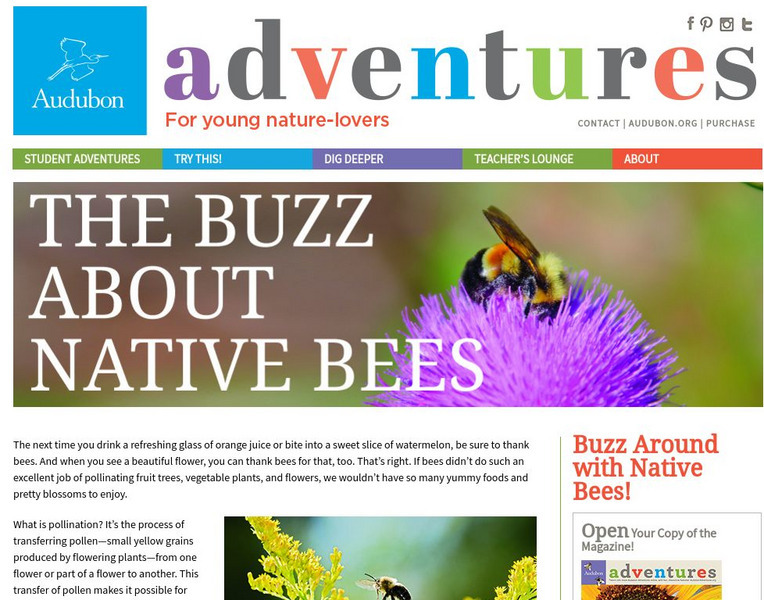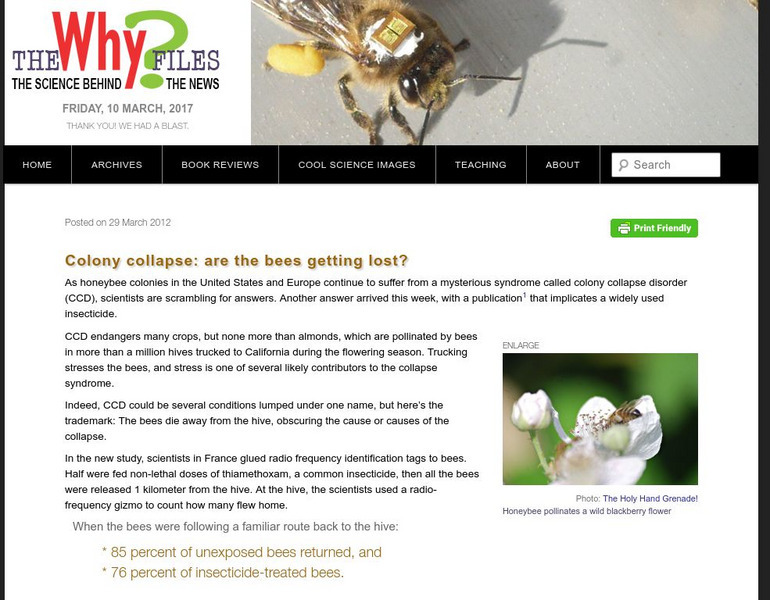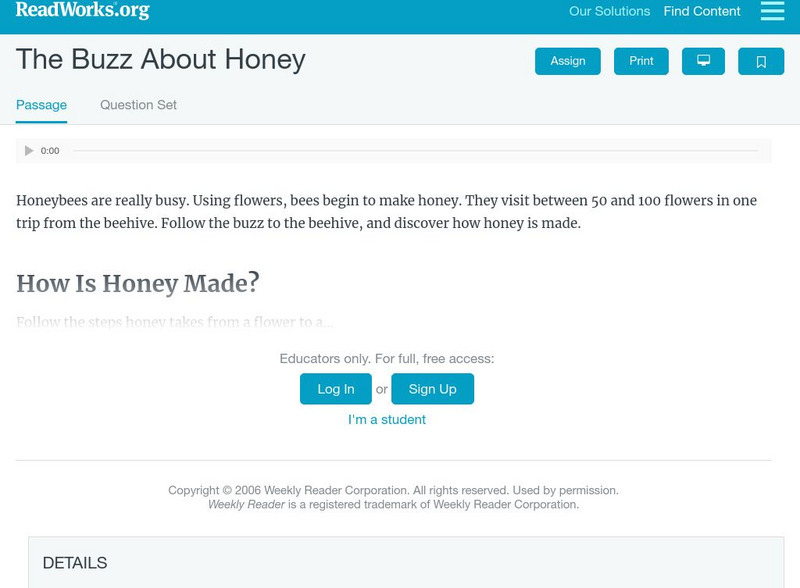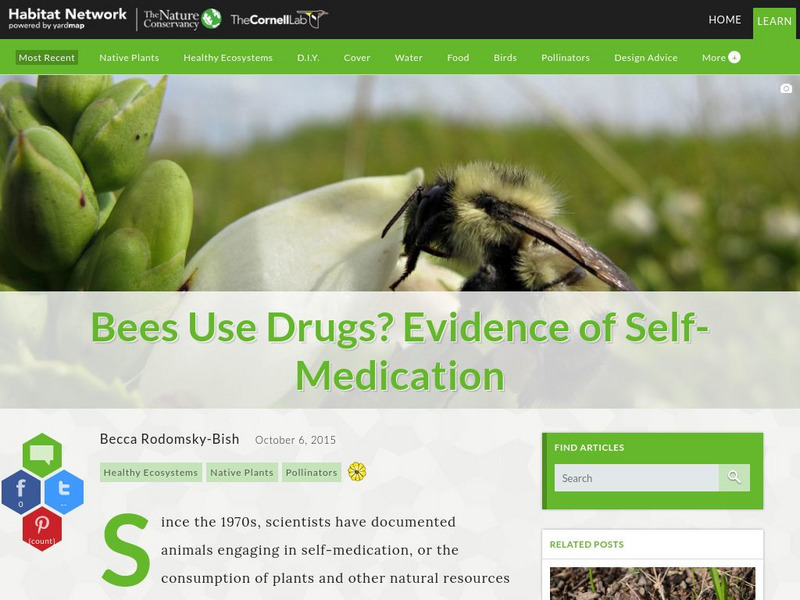Curated OER
I Wonder What a Pest Is...
Students observe what animals are considered to be pests and why. They conduct a mock trial of a honeybee arguing if it is a pest or not. They determine pros and cons of honeybees to prepare for the trial.
Curated OER
"The Buzz About Honeybees"
In this reading comprehension worksheet, students read an article on, "The Buzz About Honeybees", and then answer 10 short answer reading comprehension questions.
Curated OER
The Disappearing Honeybees: Tracking Honeybee Decline
Students practice graphing and other math skills to track number of honeybee colonies present in United States since 1978, discuss major crops that are dependent on insect pollinators, and examine reasons for decline of United States...
Curated OER
Honey ! I Blew Up The Bee!
Second graders complete a variety of bee-themed activities. They consider the importance of honeybees in food production, conduct Internet research, prepare foods using honey, complete puzzles and compile a portfolio of their work.
TED Talks
Ted: Ted Ed: The Human and the Honeybee
Both honeybees and humans originated in East Africa, and the connection between us has survived the ages. Dino Martins encourages us to remember how much we owe to these magnificent insects. [6:25]
TED Talks
Ted: Ted Ed: The Hidden Beauty of Pollination
Pollination is a vital to life on Earth but largely unseen by the human eye. Filmmaker Louie Schwartzberg shows us the intricate world of pollen and pollinators with gorgeous high-speed images from his film "Wings of Life," inspired by...
National Audubon Society
National Audubon Society: Audubon Adventures: The Buzz About Native Bees
Resources for learning about the important role bees play in pollinating plants, especially those we eat. Includes a student magazine full of information about bees, an interactive pollination chart, and a quiz.
CK-12 Foundation
Ck 12: Biology: Insects
[Free Registration/Login may be required to access all resource tools.] Discusses characteristics of insects.
Unite for Literacy
Unite for Literacy: Animals: The Busiest Bugs I Know
Read about all the work that bees do and why they are so important to humans. Includes audio narration in 15 additional languages with text in English.
TED Talks
Ted: Ted Ed: The Case of the Vanishing Honeybees
A lesson investigating the decreasing population of the US honeybee population. There is a video that explores possible causes and the effect this decrease has on our environment. After the video, the students can test their knowledge...
Encyclopedia of Life
Encyclopedia of Life: European Honey Bee
Comprehensive reference tool investigates the European honey bee with a description, pictures, and maps. Includes facts on ecology, habitat, behavior, conservation, and external links.
PBS
Pbs Learning Media: Reclaiming Habitat for Honeybees
Explore the role of pollinators in their ecosystems, develop a written response to one of three questions about the importance of honeybees, gather evidence about Coal Country BeeWorks' efforts to reclaim surface mining sites,.
University of Wisconsin
The Why Files: Honeybees Getting Lost?
As colony collapse disorder continues to attack honeybee hives, a new study shows that a common insecticide interferes with their return flights.
TED Talks
Ted: Ted Ed: Why Do Honeybees Love Hexagons?
Zack Patterson and Andy Peterson delve into the very smart geometry behind the honeybee's home. [3:58]
TED Talks
Ted: Ted Ed: Every City Needs Healthy Honey Bees
Bees have been rapidly and mysteriously disappearing from rural areas, with grave implications for agriculture. But bees seem to flourish in urban environments- and cities need their help, too. Noah Wilson-Rich suggests that urban...
National Audubon Society
National Audubon Society: Audubon Adventures: The Pollination Story
A colorful, interactive chart illustrating the stages in the pollination of flowers by bees.
Johns Hopkins University
The Buzz About Bees: A Web Quest on Honey Bees
This WebQuest helps students learn about the importance of honey bees. After gathering information, students will work in groups to create a 2 minute commercial on the importance of the honey bee.
University of Kentucky
Uk: Starting an Observation Hive of Honey Bees
This interesting site explains how one goes about creating a honey bee hive for observation purposes.
Cornell Lab of Ornithology
Habitat Network: Habitat Feature: Bee Houses
Find out what bees and bee hives can bring to a backyard habitat.
Read Works
Read Works: The Buzz About Honey
[Free Registration/Login Required] An informational text about honey and how it is made. A question sheet is available to help students build skills in reading comprehension.
Read Works
Read Works: The Buzz About Honey
[Free Registration/Login Required] This nonfiction passage discusses the role of honeybees in producing honey. This passage is intended for guided practice and is designed to reinforce essential reading comprehension skills.
Cornell Lab of Ornithology
Habitat Network: Bees Use Drugs? Evidence of Self Medication
There has been documented evidence that honey bees increase their foraging of antibiotic plant resins when under stress from fungal pathogens. Could more access to certain plants provide some solutions for decreasing bee populations?
Wonderville Media
Wonderville: Honey Bees
Honey bees are a very important part of nature. We all know that honey comes from bees, but what else do you know about honey bees? Learn more about Honey Bees in this well-constructed overview by Wonderville.
Alabama Learning Exchange
Alex: Honey Bees
The young scholars will do research to learn the various functions of bees within the hive and understand the process of making honey. Students will use numerous resources to find their information including the Internet, library books,...























